De Molli, V., (2013), “European Best Performers in Times of Crisis”, EconoMonitor, 18 September. In the context of the current financial and economic crisis, The European House – Ambrosetti decided to analyse the economic performance of European countries in the last 10 years in order to comprehend the most resilient countries during the crisis (2008-2012) The study outlines common features, strategies and political choices that have contributed to achieve positive …Read More
The future of Europe’s economy: Disaster or deliverance?
Whyte, P. and Tilford, S. eds., (2013), The future of Europe’s economy: Disaster or deliverance?, Center for European Reform, 18 September. The CER invited four leading economists to predict what the European economy will look like in 2020. Their answers differ sharply. Paul De Grauwe fears for the future because the eurozone’s creditor countries have succeeded in loading nearly all of the cost of eurozone adjustment onto the debtor nations. …Read More
-15% to +4%: Taylor-rule interest rates for euro area countries
Darvas, Z. and Merler, S., (2013), “-15% to +4%: Taylor-rule interest rates for euro area countries”, Bruegel, 18 September. Does one size fit all? Before the crisis, there was a major debate on whether the single interest rate set by the European Central Bank (ECB) would be suitable for all members of the euro area, which have diverse economic conditions. The debate became quieter since the euro-crisis, as there is …Read More
Reassessing the Role and Modalities of Fiscal Policy in Advanced Economies
IMF, (2013), “Reassessing the Role and Modalities of Fiscal Policy in Advanced Economies”, IMF Policy Paper, 17 September. This paper investigates how developments during and after the 2008–09 crisis have changed economists’ and policymakers’ views on: (i) fiscal risks and fiscal sustainability; (ii) the effectiveness of fiscal policy as a countercyclical tool; (iii) the appropriate design of fiscal adjustment programs; and (iv) the role of fiscal institutions. Advanced economies have …Read More
Distributional Consequences of Fiscal Consolidation and the Role of Fiscal Policy: What Do the Data Say?
Woo, J., Bova, E., Kinda, T. and Zhang, S., (2013), “Distributional Consequences of Fiscal Consolidation and the Role of Fiscal Policy: What Do the Data Say?”, IMF Working Papers Series, WP/13/195, September. The 2007-09 Great Recession has led to an unprecedented increase in public debt in many countries, triggering substantial fiscal adjustments. What are the distributional consequences of fiscal austerity measures? This is an important policy question. This paper analyzes …Read More
The wisdom of crisis prevention
Şimşek, M., (2013), “The wisdom of crisis prevention”, Project Syndicate, 17 September. Regardless of how differently governments may formulate policy, ensuring financial stability is their common responsibility. This calls for real and effective policy coordination and an overarching macro-prudential governance framework at both the domestic and international levels. The simple truth is that the cost of preventing financial crises is much lower than the costs imposed by them after they …Read More
Has Capitalism Revived/Survived?
Posner, R., (2013), “Has Capitalism Revived/Survived?”, The Becker-Posner Blog, 16 September. Capitalism is the economic system in which the assets used to produce goods and services are privately owned, and the owners determine the price at which to sell those goods and services. Private markets, because they organize and direct production and consumption, are the basic institutions of a capitalist system. Government regulation of markets is (in capitalist theory) limited …Read More
Ignore the doomsayers: Europe is being fixed
Schäuble, W., (2013), “Ignore the doomsayers: Europe is being fixed”, Financial Times, 16 September. Τhe world should rejoice at the positive economic signals the eurozone is sending almost continuously these days. While the crisis continues to reverberate, the eurozone is clearly on the mend both structurally and cyclically. What is happening turns out to be pretty much what the proponents of Europe’s cool-headed crisis management predicted. The fiscal and structural …Read More
Ordoliberalism and Germany’s approach to the euro crisis
Cohen-Setton, J., (2013), “Ordoliberalism and Germany’s approach to the euro crisis”, Bruegel , 16 September. The debate over the legacy of ordoliberal ideas in Germany’s approach to the euro crisis has gained renewed interests ahead of the federal election, which will be held on 22 September 2013 to determine the members of the 18th Bundestag. Beyond the question of whether a change in government would dramatically change the country’s approach …Read More
Five years of financial non-reform
Admati, A., (2013), “Five years of financial non-reform”, Project Syndicate, 13 September. Five years after the collapse of Lehman Brothers triggered the largest global financial crisis since the Great Depression, outsize banking sectors have left economies shattered in Ireland, Iceland, and Cyprus. Banks in Italy, Spain, and elsewhere are not lending enough. China’s credit binge is turning into a bust. In short, the world’s financial system remains dangerous and dysfunctional. …Read More





